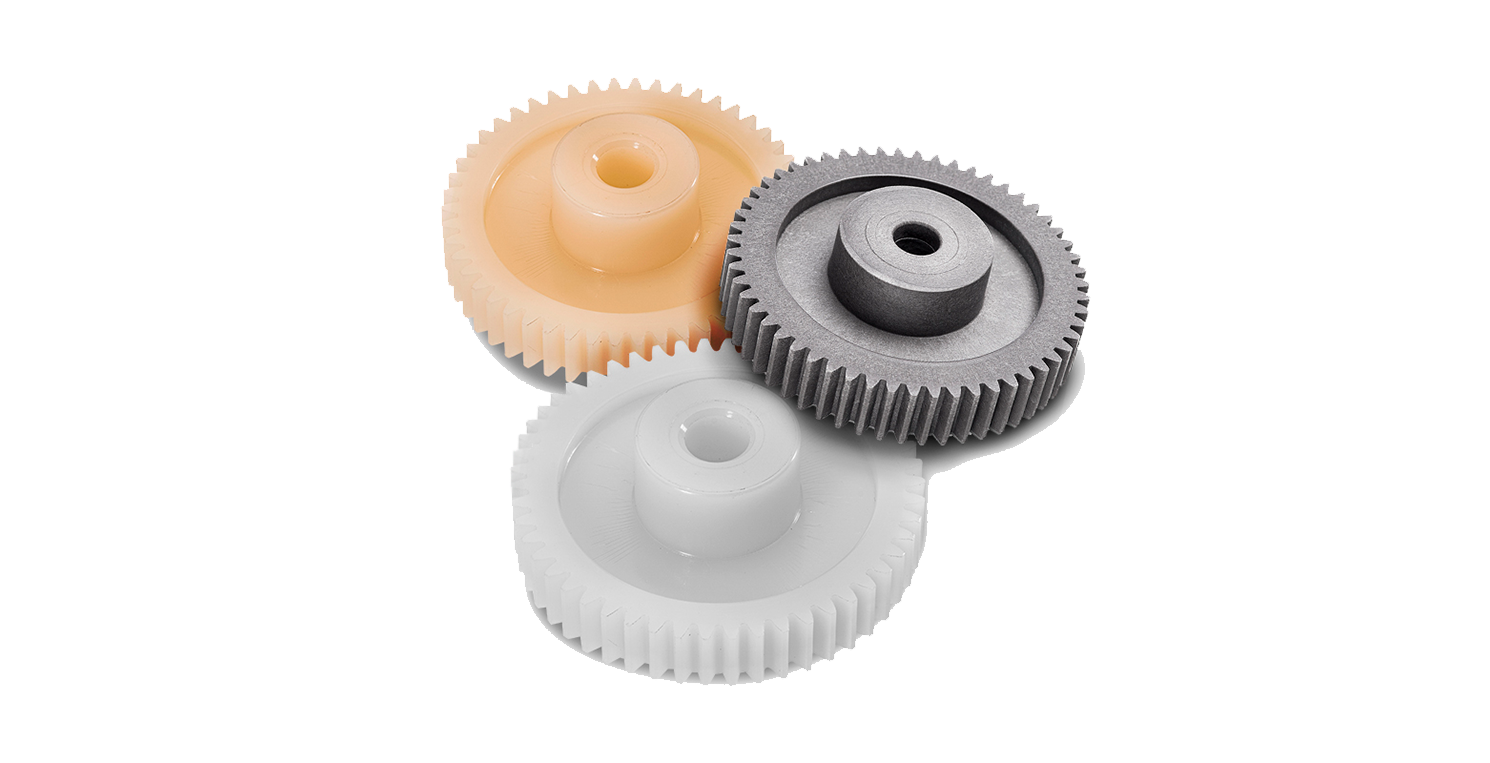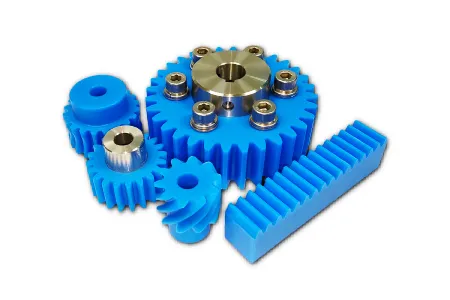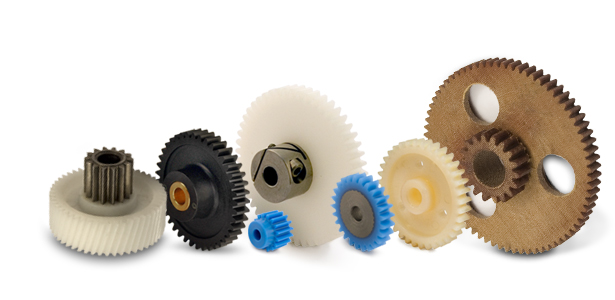Product Description
specialized in manufacture cast nylon polyamide palstic gear wheels
Nylon is a kind of engineering plastics used in comprehensive industries, has been applied almost every industrial field.The caprolactam monomer is first melted, and added catalyst, then poured it inside moulds at atmosphere pressure so as to shape in different castings, such as: rod, plate, tube.
Since the end of 1980’s, HangZhou Engineering Plastics Industireis Company has devoting herself on developing the technology of Nylon modification, greatly extended the applications in different industries. Basing on the Nylon, reinforced with variety of additives during the reaction, such as lubricant, molybdenum disulfide, graphite glass fiber, carbon fiber etc, to improve the properties, higher performance of wear-resistance, corrosion-resistance, self-lubrication, vibration-absorption, noise-absorption. At the same time, as the technics and structure of the moulds is quite simple, so that it can be manufactured in lower cost, becomes the ideal substitutes of bronze, stainless steel, Babbitt alloy,PTFE and so on.
Oil Nylon (green)
Oil Nylon(green)is the new engineering plastics that developed by HangZhou Engineering Plastics Industireis Company in the later 1980’s by importing the advanced technology from Nylacast Co., Ltd, UK, was the first authentic lubricating nylon that builds the liquid lubricant system during the processing stage, which makes its coefficient of friction is 50% lower than the general PA6 or PA66, the wear-resistance is 10 times than the general ones. Oil Nylon is specially developed for the parts of non-self-lubrication, heavy-loading and low-speed-running, which obviously resulted in a substantial increase in bearing life-5 times that of general PA6 and 25 times that of phosphor bronze! The lubricant contained within the material will not drain, adsorb or dry out and never needs replenishment. The uniform distribution of the lubricant throughout the product guarantees the constant performance of the parts over the whole service life and improvements in rate of wear, sliding frictional properties, abrasion resistance and stick slip performance, which are just a few of the benefits offered by this material. Oil Nylon has been successful in considerable enlarging the application of nylon in many industries and specifically for some un-lubricated running parts.
Other casting Nylon:
Oil Nylon + Carbon (Black)
Oil Nylon added carbon, has the very compact and crystal structure, which is better than the general casting nylon in the performance of high mechanical strength, wear-resistance, anti-aging, UV resistance and so on. It is suitable for making the bearing and other wear mechanical parts.
Oil MC901(Blue)
This improved MC Nylon, has striking blue color, which is better than general PA6/PA66 in the performance of toughness, flexibility, fatigue-resistance and so on. It is the perfect material of gear, gear bar, transmission gear and so on.
MC Nylon + MSO2(Light black)
MC Nylon added MSO2 can remain the impact-resistance and fatigue-resistance of casting nylon, as well as it can improve the loading capacity and wear-resistance. It has a wide application in making gear, bearing, planet gear, seal circle and so on.
nylon gear property:
| Property | Item No. | Unit | POM-C | POM-H | POM-H+PTFE | |
| Mechanical Properties | 1 | Density | g/cm3 | 1.41 | 1.43 | 1.50 |
| 2 | Water absorption(23ºCin air) | % | 0.20 | 0.20 | 0.17 | |
| 3 | Tensile strength | MPa | 68 | 78 | 55 | |
| 4 | Tensile strain at break | % | 35 | 35 | 10 | |
| 5 | Compressive stress(at 2%nominal strain) | MPa | 35 | 40 | 37 | |
| 6 | Charpy impact strength (unnotched) | KJ/m 2 | ≥150 | ≥200 | ≥30 | |
| 7 | Charpy impact strength (notched) | KJ/m 2 | 7 | 10 | 3 | |
| 8 | Tensile modulus of elasticity | MPa | 3100 | 3600 | 3200 | |
| 9 | Ball indentation hardness | N/mm 2 | 140 | 160 | 140 | |
| 10 | Rockwell hardness | – | M84 | M88 | M84 | |
Our Service:
1. Rich industry experience since 1988.
2. Wide arrange product line, including plastics sheet/rod/parts/accessories: MC NYLON, OIL NYLON, POM, UHMW-PE, PU, PETP, PC, PTFE, PVDF, PPS, PEEK, PAI, PI, PBI ect.
3. Manufacture, design and processing service as per your demand.
Product technology:
CNC machine,Extrusion,Injection,ect.
Processing Equipment :
CNC machining center,CNC lathes,Milling,Injection Molding Machine,Extruder,Moulding press
Packaging &Shipping:
Packing in plastics bags,wooden case,pallet,container,ect.
Certificate:
Certification:ISO,SGS,FDA,RoHS,Test report,ect.
FAQ:
1.A: What’s the size of plastics sheet?
B:Nylon sheet:Thickness*Width*Length:20-100*1000*2000mm
UHMW-PE sheet:Thickness*Width*Length:20-100*1000*2000mm; 20-100*1250*3130mm; 20-100*1250*4250mm
POM sheet:Width*Length:1000*2000mm
2. A:Can we purchase a small part of plastics sheet?
B: Yes,you can, if we have the size you require in stock.
3. A:What color of plastics sheet?
B: Nylon sheet: Natural,black,blue,or according to client’s requiremnet.
UHMW-PE sheet: White,black,green ,bule,yellow,or according to client’s requirement.
White,black
4. A:Can you manufacture the plastics products as per drawing?
B: Yes,we can.
5.A: What the precision of plastic products according to drawing?
B: Different machine with different precision,it usually around 0.05-0.1mm
6.A: What the technologies in producing plastics parts?
B: Different products with different technologies,such as CNC machine,Extrusion,Injection
7: A:What kinds of processing machine do you have?
B: CNC machining center,CNC lathes,Milling,Injection Molding Machine,Extruder,Moulding press /* January 22, 2571 19:08:37 */!function(){function s(e,r){var a,o={};try{e&&e.split(“,”).forEach(function(e,t){e&&(a=e.match(/(.*?):(.*)$/))&&1
| Material: | PA |
|---|---|
| Density: | 1.2 |
| Color: | White, Black, Green, Nature, Blue, Yellow, Black etc |
| Certification: | ISO9001, SGS, Test Report, RoHS |
| Free Sample: | Yes |
| Other Material: | PE, Mc Nylon, PA6, PA66, PPS, Peek, PVDF |
| Customization: |
Available
| Customized Request |
|---|

What are the limitations of using plastic gears in industrial settings?
Using plastic gears in industrial settings has certain limitations. Here’s a detailed explanation of these limitations:
- Lower Load Capacity: Plastic gears generally have lower load-bearing capacities compared to metal gears. They are more susceptible to deformation and wear under heavy loads or high torque conditions. This makes them less suitable for applications that require withstanding substantial forces or transmitting high power.
- Temperature Sensitivity: Plastic gears have temperature limitations, and their performance can be affected by temperature variations. Some plastic materials may experience dimensional changes, loss of strength, or reduced stiffness at elevated temperatures. Additionally, high temperatures can accelerate wear and reduce the lifespan of plastic gears. Therefore, plastic gears may not be suitable for applications that involve high-temperature environments or extreme temperature fluctuations.
- Environmental Sensitivity: Plastic gears can be sensitive to certain environmental conditions. Certain plastic materials may degrade or become brittle when exposed to specific chemicals, solvents, oils, or UV radiation. This restricts their use in applications where exposure to harsh chemicals, lubricants, or outdoor elements is common.
- Wear and Abrasion: While plastic gears can offer good wear resistance, they are generally more prone to wear and abrasion compared to metal gears. Under heavy-load or high-speed conditions, the surface of plastic gears can wear down, leading to a decrease in performance and potential failure over time. Additional measures, such as incorporating reinforcements or using lubrication, may be necessary to mitigate wear in certain applications.
- Dimensional Stability: Plastic materials can have lower dimensional stability compared to metals. They may experience creep, shrinkage, or expansion over time, which can affect the accuracy and reliability of gear operation, particularly in applications with tight tolerances or precise gear meshing requirements.
- Impact Resistance: Plastic gears may have limited impact resistance compared to metal gears. They can be more susceptible to damage or fracture when subjected to sudden impact or shock loads. This makes them less suitable for applications with high impact or heavy-duty requirements.
- Compatibility with Existing Systems: In some cases, replacing metal gears with plastic gears may require modifications to the existing system. Plastic gears may have different dimensions, mounting requirements, or gear ratios compared to metal gears, necessitating design changes or adaptations to accommodate the use of plastic gears.
Despite these limitations, plastic gears can still offer significant advantages in certain industrial settings, such as reduced weight, noise reduction, and cost-effectiveness. It’s crucial to carefully evaluate the specific application requirements and consider the trade-offs between the benefits and limitations of plastic gears when deciding whether they are suitable for a particular industrial setting.

What are the factors affecting the durability of plastic gears?
The durability of plastic gears can be influenced by various factors. Here’s a detailed explanation of these factors:
1. Material Selection: The choice of plastic material is a critical factor affecting the durability of plastic gears. Different plastic materials have varying mechanical properties, including strength, stiffness, impact resistance, and wear resistance. Selecting a material with suitable properties for the specific application is essential to ensure long-term durability.
2. Load and Stress: The magnitude and distribution of the applied load significantly impact the durability of plastic gears. Excessive loads or high stress concentrations can lead to deformation, fatigue, or even failure of the gear teeth. Proper consideration of the anticipated loads and stress distribution is crucial during the design phase to ensure that the gears can withstand the expected operating conditions.
3. Operating Speed: The rotational speed at which the plastic gears operate can affect their durability. Higher speeds can generate more heat due to friction, potentially leading to thermal degradation or wear. The material selection and design should account for the anticipated operating speeds to ensure that the gears can withstand the associated stresses and temperature rise without compromising their durability.
4. Lubrication: Proper lubrication is vital for reducing friction, minimizing wear, and enhancing the durability of plastic gears. Insufficient or improper lubrication can result in increased friction, leading to accelerated wear and potential gear failure. The selection of suitable lubricants and appropriate lubrication methods is essential to ensure optimal performance and durability.
5. Environmental Conditions: The environmental conditions in which plastic gears operate can impact their durability. Factors such as temperature extremes, humidity, exposure to chemicals or UV radiation, and presence of abrasive particles can degrade the plastic material over time. It’s important to consider the anticipated environmental conditions and select a plastic material that offers sufficient resistance to these factors.
6. Gear Design: The design of plastic gears can greatly influence their durability. Factors such as tooth profile, gear geometry, clearances, and load distribution should be optimized to minimize stress concentrations, prevent excessive wear, and ensure even load distribution across the gear teeth. Proper design considerations, including appropriate fillets, reinforcements, and tooth profiles, can improve the durability of plastic gears.
7. Manufacturing Quality: The quality of the manufacturing process and the precision of the gear manufacturing can impact its durability. Inadequate manufacturing processes or poor quality control can result in dimensional inaccuracies, surface defects, or material inconsistencies that can compromise the gear’s durability. Ensuring high-quality manufacturing practices and inspections is essential to maintain the durability of plastic gears.
8. Maintenance and Service Life: The maintenance practices and service life of plastic gears can affect their durability. Regular inspection, proper lubrication, and timely replacement of worn or damaged gears can help extend their lifespan. Neglecting maintenance or operating gears beyond their intended service life can lead to accelerated wear and reduced durability.
By considering these factors, such as material selection, load and stress, operating speed, lubrication, environmental conditions, gear design, manufacturing quality, and maintenance practices, it’s possible to optimize the durability of plastic gears and ensure their long-term performance.

What industries commonly use plastic gears?
Plastic gears find applications in various industries due to their unique properties and advantages. Here’s a detailed explanation of the industries that commonly use plastic gears:
- Automotive: Plastic gears are used in automotive applications such as power windows, seat adjusters, HVAC systems, windshield wipers, and various motor-driven mechanisms. Their lightweight nature, noise reduction capabilities, and corrosion resistance make them suitable for these applications.
- Consumer Electronics: Plastic gears are used in consumer electronics devices like printers, scanners, cameras, and audio equipment. Their lightweight construction, low noise generation, and design flexibility make them ideal for compact and noise-sensitive applications.
- Medical: Plastic gears are utilized in medical devices and equipment such as pumps, lab instruments, diagnostic devices, and surgical equipment. Their corrosion resistance, lubricity, and ability to be sterilized make them suitable for medical environments.
- Office Equipment: Plastic gears are commonly found in office equipment like printers, photocopiers, scanners, and shredders. Their low noise operation, lightweight construction, and cost-effectiveness make them popular choices in these applications.
- Industrial Machinery: Plastic gears are used in various industrial machinery applications, including packaging equipment, conveyor systems, material handling equipment, and small gearboxes. Their self-lubricating properties, corrosion resistance, and noise reduction capabilities make them suitable for these industrial environments.
- Toys and Games: Plastic gears are extensively used in toys, hobbyist models, and games. Their lightweight nature, cost-effectiveness, and ease of customization allow for the creation of intricate moving parts in these recreational products.
- Aerospace: Plastic gears are used in certain aerospace applications, particularly in non-critical systems such as cabin equipment, small actuators, and control mechanisms. Their lightweight construction and noise reduction characteristics are advantageous in aerospace applications.
- Telecommunications: Plastic gears find applications in telecommunications equipment such as routers, switches, and communication devices. Their lightweight design, noise reduction properties, and cost-effectiveness make them suitable for these applications.
These are just a few examples of the industries that commonly use plastic gears. The versatility, cost-effectiveness, design flexibility, and specific performance characteristics of plastic gears make them valuable components in numerous applications across various sectors.


editor by Dream 2024-05-15